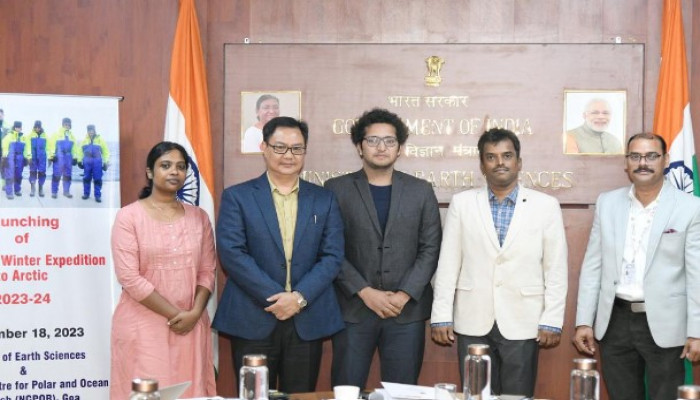RRI deploys India's first team for winter expedition to the Arctic
- In Reports
- 02:36 PM, Dec 19, 2023
- Myind Staff
The Raman Research Institute (RRI) is poised to embark on India's pioneering winter expedition to the Arctic, signifying a noteworthy achievement in the nation's scientific exploration endeavours.
This expedition led by the National Centre for Polar and Ocean Research (NCPOR) in Goa, will see researchers from RRI venturing into unexplored territories. Their primary focus will be the characterization of the radio frequency environment in the Svalbard region of the Arctic. This marks a crucial step in understanding the unique challenges and opportunities presented by this remote and vital part of the globe.
Girish BS, heading the Electronics Engineering Group at RRI, is leading a groundbreaking survey to evaluate the feasibility of precise astronomy measurements in the Svalbard region. This comprehensive survey spans various disciplines, including astronomy, climate change, and atmospheric science.
The team, under Girish BS's leadership, is conducting a thorough examination of the radio frequency environment at Svalbard, marking a historic initiative with no precedent in the region. The results of this survey bear significant historical importance and have the potential to pave the way for the deployment of low-frequency radio telescopes, opening up new possibilities in the field.
Commencing on December 19 and concluding on January 15, the team embarks on a month-long scientific expedition financed by the Ministry of Earth Sciences (MoES). Aligned with India's enduring Arctic presence since the inception of the Himadri research station in 2008, this mission underscores the nation's commitment to Arctic exploration.
At the forefront of technological advancements, engineers and scientists from RRI are driving the development of the SARAS (Shaped Antenna measurement of the background Radio Spectrum) series of experiments. SARAS is dedicated to the examination of the faint cosmological signal from hydrogen, commonly referred to as the 21-cm signal, focusing on the pivotal periods of the Cosmic Dawn and the Epoch of Reionization.
Saurabh Singh, an associate professor at RRI and the principal investigator of the experiment, highlighted the noteworthy scientific achievements of SARAS derived from observations conducted in various regions of India, including remote areas in Ladakh and the backwaters of Western Karnataka. The pivotal factor contributing to SARAS's success has been its accessibility to radio-quiet locations.
Singh emphasized that the upcoming Arctic survey aims to provide insights into the radio quietness of the Ny-Ålesund location, situated in Svalbard, for the potential deployment of the SARAS radio telescope.
Professor Tarun Souradeep, the director of RRI, expressed satisfaction in stating, "For over 75 years, RRI has played a pivotal role in advancing the frontiers of global scientific exploration. It is heartening to witness the enthusiastic response from colleagues towards the inaugural winter Indian expedition to the Arctic. The primary objective is to explore the feasibility of deploying the SARAS radio telescope, a home-built apparatus globally recognized for its exceptional sensitivity in detecting the subtle signals of the cosmic dawn when the first galaxies illuminated the universe."
Image source: Times of India







Comments